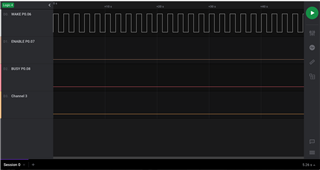Working with nrf52832_mdk and using basic GPIO functionality, I am unable to toggle the GPIO pins P0.0 or P0.1. The code I am using is quite simple and I am able to toggle the LED's on a nrf52840_pca10056 when compiled in that environment. When compiling on with nrf52932_mdk, I expect to see some activity on the pins P0.0 or P0.01 when I specify pin 0 or 1, however, there appears to be no activity. My code is below:
nt gpio_set( int pin, bool set ) { int err; struct device *dev; dev = device_get_binding("GPIO_0"); gpio_pin_configure( dev, pin, GPIO_OUTPUT_ACTIVE ); if( verbose == true ){ if ( set == true ) { printk("Set GPIO Pin %d - %d", pin,set); }else{ printk("Clear GPIO Pin %d - %d", pin,set ); } } err = gpio_pin_set(dev, pin, set); if ( verbose == true ) { if (err == 0) { printk("SUCCESS\n"); }else{ printk("FAILED\n"); } } return( err ); }
Any clues as to why my pins are not toggles would be greatly appreciated.
Tom



